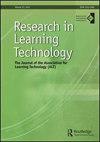{"title":"正规教育中的应急远程教学分析:当代三种技术教学框架的交叉检验","authors":"Ronen Kasperski, Erez Porat, I. Blau","doi":"10.25304/rlt.v31.2982","DOIUrl":null,"url":null,"abstract":"During the COVID-19 pandemic outbreak many countries around the world were forced to turn to Emergency Remote Teaching (ERT) and upscale the use of digital technologies for learning, teaching and assessment. The current study analysed field reports from 89 elementary and secondary Hebrew-speaking and Arabic-speaking information and communication technology schools in Israel, representing the cultural, ethnic, and religious diversity of the education system. The qualitative analysis of the collected data was based on three well established contemporary models of technology integration and Digital Competence of Educators (DigCompEdu): the International Society for Technology in Education, Technological Pedagogical Content Knowledge and DigCompEdu. The analysis (n = 872 statements) yielded aspects in the teachers' reports that correspond with the theoretical models, along-side aspects that extend these models to ERT and aspects that were missing from the reports. Finally, based on our findings and previous work we suggested a comprehensive framework for ERT that can be used to design teachers' professional development necessary for effective remote teaching in both emergency and routine times. © 2023, Association for Learning Technology. All rights reserved.","PeriodicalId":46691,"journal":{"name":"Research in Learning Technology","volume":"18 1","pages":""},"PeriodicalIF":1.9000,"publicationDate":"2023-05-12","publicationTypes":"Journal Article","fieldsOfStudy":null,"isOpenAccess":false,"openAccessPdf":"","citationCount":"0","resultStr":"{\"title\":\"Analysis of emergency remote teaching in formal education: crosschecking three contemporary techno-pedagogical frameworks\",\"authors\":\"Ronen Kasperski, Erez Porat, I. Blau\",\"doi\":\"10.25304/rlt.v31.2982\",\"DOIUrl\":null,\"url\":null,\"abstract\":\"During the COVID-19 pandemic outbreak many countries around the world were forced to turn to Emergency Remote Teaching (ERT) and upscale the use of digital technologies for learning, teaching and assessment. The current study analysed field reports from 89 elementary and secondary Hebrew-speaking and Arabic-speaking information and communication technology schools in Israel, representing the cultural, ethnic, and religious diversity of the education system. The qualitative analysis of the collected data was based on three well established contemporary models of technology integration and Digital Competence of Educators (DigCompEdu): the International Society for Technology in Education, Technological Pedagogical Content Knowledge and DigCompEdu. The analysis (n = 872 statements) yielded aspects in the teachers' reports that correspond with the theoretical models, along-side aspects that extend these models to ERT and aspects that were missing from the reports. Finally, based on our findings and previous work we suggested a comprehensive framework for ERT that can be used to design teachers' professional development necessary for effective remote teaching in both emergency and routine times. © 2023, Association for Learning Technology. All rights reserved.\",\"PeriodicalId\":46691,\"journal\":{\"name\":\"Research in Learning Technology\",\"volume\":\"18 1\",\"pages\":\"\"},\"PeriodicalIF\":1.9000,\"publicationDate\":\"2023-05-12\",\"publicationTypes\":\"Journal Article\",\"fieldsOfStudy\":null,\"isOpenAccess\":false,\"openAccessPdf\":\"\",\"citationCount\":\"0\",\"resultStr\":null,\"platform\":\"Semanticscholar\",\"paperid\":null,\"PeriodicalName\":\"Research in Learning Technology\",\"FirstCategoryId\":\"1085\",\"ListUrlMain\":\"https://doi.org/10.25304/rlt.v31.2982\",\"RegionNum\":0,\"RegionCategory\":null,\"ArticlePicture\":[],\"TitleCN\":null,\"AbstractTextCN\":null,\"PMCID\":null,\"EPubDate\":\"\",\"PubModel\":\"\",\"JCR\":\"Q2\",\"JCRName\":\"EDUCATION & EDUCATIONAL RESEARCH\",\"Score\":null,\"Total\":0}","platform":"Semanticscholar","paperid":null,"PeriodicalName":"Research in Learning Technology","FirstCategoryId":"1085","ListUrlMain":"https://doi.org/10.25304/rlt.v31.2982","RegionNum":0,"RegionCategory":null,"ArticlePicture":[],"TitleCN":null,"AbstractTextCN":null,"PMCID":null,"EPubDate":"","PubModel":"","JCR":"Q2","JCRName":"EDUCATION & EDUCATIONAL RESEARCH","Score":null,"Total":0}
引用次数: 0
Analysis of emergency remote teaching in formal education: crosschecking three contemporary techno-pedagogical frameworks
During the COVID-19 pandemic outbreak many countries around the world were forced to turn to Emergency Remote Teaching (ERT) and upscale the use of digital technologies for learning, teaching and assessment. The current study analysed field reports from 89 elementary and secondary Hebrew-speaking and Arabic-speaking information and communication technology schools in Israel, representing the cultural, ethnic, and religious diversity of the education system. The qualitative analysis of the collected data was based on three well established contemporary models of technology integration and Digital Competence of Educators (DigCompEdu): the International Society for Technology in Education, Technological Pedagogical Content Knowledge and DigCompEdu. The analysis (n = 872 statements) yielded aspects in the teachers' reports that correspond with the theoretical models, along-side aspects that extend these models to ERT and aspects that were missing from the reports. Finally, based on our findings and previous work we suggested a comprehensive framework for ERT that can be used to design teachers' professional development necessary for effective remote teaching in both emergency and routine times. © 2023, Association for Learning Technology. All rights reserved.


